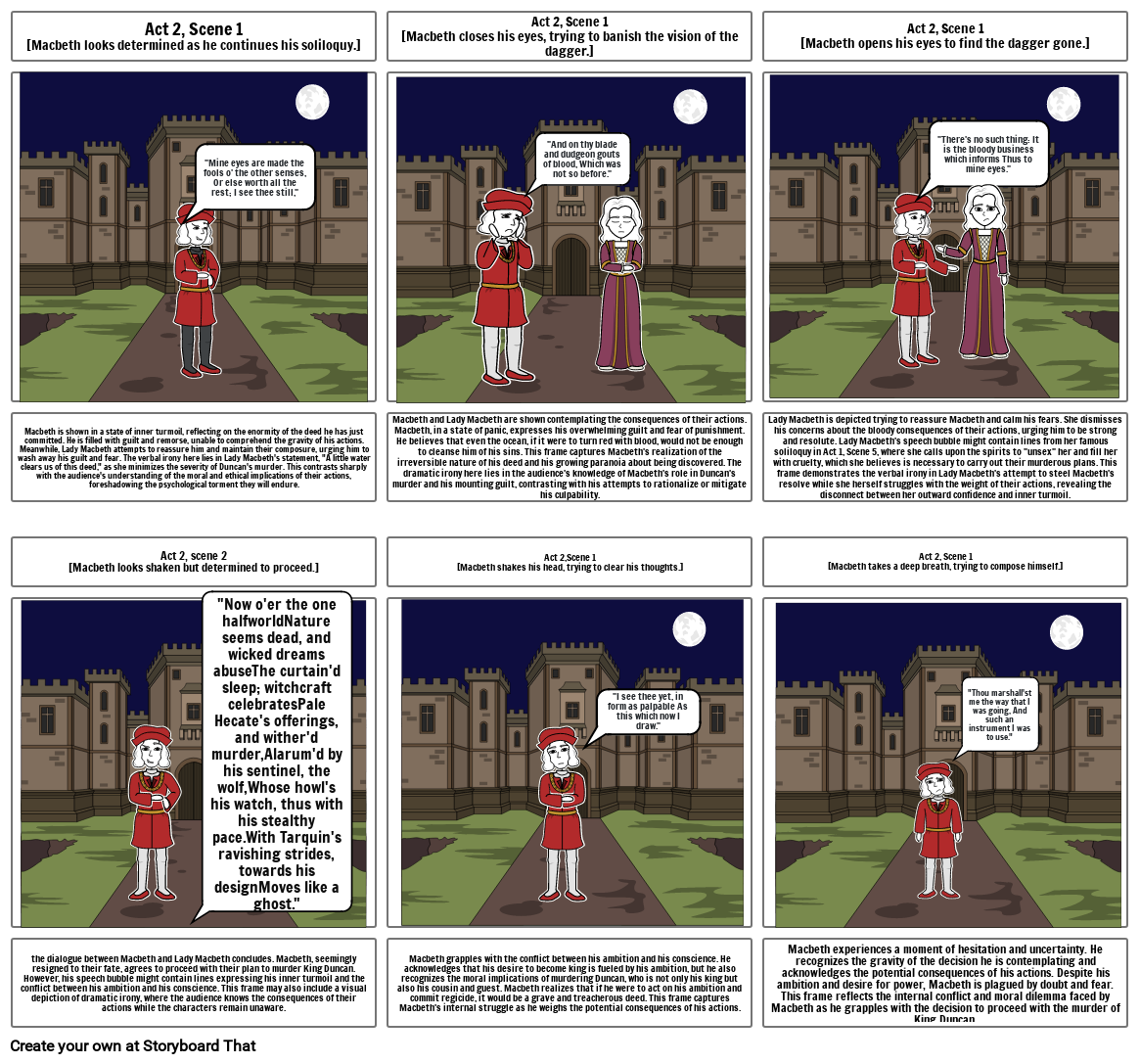Macbeth Act 2

Storyboard-Text
- Act 2, Scene 1[Macbeth looks determined as he continues his soliloquy.]
- Is this a dagger which I see before me, The handle toward my hand? Come, let me clutch thee.
- Act 2, Scene 1[Macbeth reaches out to grab the imaginary dagger.]
- I have thee not, and yet I see thee still."
- Act 2, Scene 1[Macbeth looks bewildered as he tries to grasp the dagger, which isn't there.]
- "Art thou not, fatal vision, sensible To feeling as to sight?"
- Macbeth alone on stage, looking troubled and deep in thought. He is staring ahead with a perplexed expression, indicating his inner turmoil and conflict over the decision to murder King Duncan. This frame sets the stage for Macbeth's soliloquy, where he grapples with his ambition and conscience.
- Act 2, scene 2[Macbeth stares at his hands, still uncertain.]
- "Or art thou but A dagger of the mind, a false creation, Proceeding from the heat-oppressed brain?"
- Macbeth is depicted in a state of inner turmoil as he wrestles with his conscience. He is torn between his ambition to seize the throne and his sense of morality, which tells him that murdering King Duncan is wrong. This conflict is evident in his facial expression and body language, which convey his unease and hesitation. Meanwhile, Lady Macbeth, unaware of his inner struggle, urges him to take action and seize the opportunity to fulfill their ambitions. The dramatic irony lies in the audience's knowledge of Macbeth's internal conflict, contrasting with Lady Macbeth's obliviousness to it.
- Act 2,Scene 1[Macbeth shakes his head, trying to clear his thoughts.]
- Macbeth is seen contemplating the consequences of his actions. He is visibly distressed and conflicted, grappling with the idea of committing regicide to fulfill his ambition. Lady Macbeth, on the other hand, is encouraging and assertive, urging Macbeth to seize the opportunity and take decisive action. The verbal irony lies in Lady Macbeth's words, as she reassures Macbeth that they will not fail, despite the audience knowing the grave repercussions their actions will have. This creates dramatic tension as the audience anticipates the unfolding tragedy, contrasting with Lady Macbeth's unwavering confidence.
- Act 2, Scene 1[Macbeth takes a deep breath, trying to compose himself.]
- "Thou marshall'st me the way that I was going, And such an instrument I was to use."
- Macbeth's soliloquy continues, and he reflects on the consequences of his contemplated actions. He acknowledges that Duncan is a virtuous and honorable king, loved and respected by many. However, Macbeth is consumed by his ambition and desires the throne for himself. Despite recognizing Duncan's virtues, Macbeth wrestles with his own ambition, torn between his loyalty to the king and his desire for power. This frame portrays Macbeth's inner turmoil as he grapples with the decision to betray Duncan.
- Macbeth grapples with the conflict between his ambition and his conscience. He acknowledges that his desire to become king is fueled by his ambition, but he also recognizes the moral implications of murdering Duncan, who is not only his king but also his cousin and guest. Macbeth realizes that if he were to act on his ambition and commit regicide, it would be a grave and treacherous deed. This frame captures Macbeth's internal struggle as he weighs the potential consequences of his actions.
- "I see thee yet, in form as palpable As this which now I draw."
- Macbeth experiences a moment of hesitation and uncertainty. He recognizes the gravity of the decision he is contemplating and acknowledges the potential consequences of his actions. Despite his ambition and desire for power, Macbeth is plagued by doubt and fear. This frame reflects the internal conflict and moral dilemma faced by Macbeth as he grapples with the decision to proceed with the murder of King Duncan.
Über 30 Millionen erstellte Storyboards

